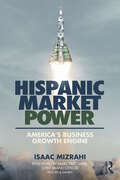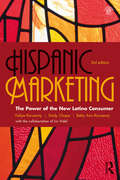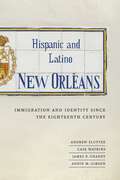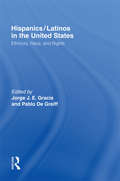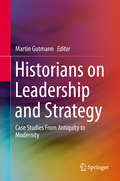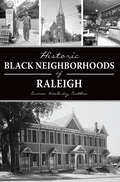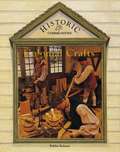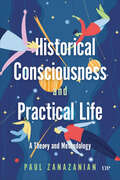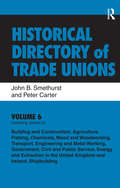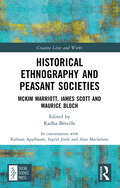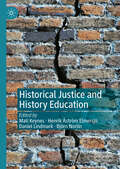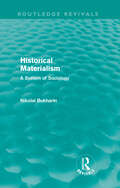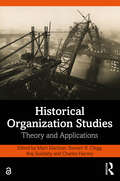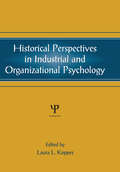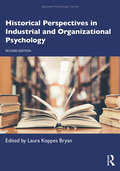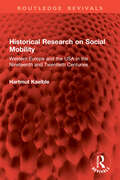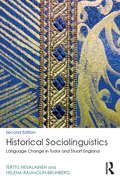- Table View
- List View
Hispanic Market Power: America’s Business Growth Engine
by Isaac MizrahiThe US Hispanic segment represents the most prominent demographic growth in the country, and a huge and untapped business opportunity for companies willing to move away from preconceived notions and market effectively to Hispanic customers. This book shows you how. Now more than ever, corporations operating in the US should see the Hispanic population at the core of their existing and future strategies, but many leaders believe Hispanic marketing is the same marketing you run for Anglos but translated into Spanish, or that all Hispanics are undocumented immigrants with no purchasing power, or that using Mariachis in their communications is the way to connect with this diverse segment. It’s time for a modern approach, and in this book, Isaac Mizrahi, one of the country’s leading voices in multicultural marketing, uses his unique experience as a corporate executive, agency CEO, and industry leader to help businesses grow by leveraging the booming Hispanic consumer segment to drive sales. Filled with straightforward talk, illustrative case studies, and pragmatic suggestions and recommendations, this book counterbalances academic books on the topic with little connection to day-to-day reality and other books with a more political standpoint. This is a business book created by a marketer for other marketers and business leaders looking to succeed in the US.
Hispanic Marketing: The Power of the New Latino Consumer
by Felipe Korzenny Sindy Chapa Betty Ann Korzenny Liz VidalThis book is about strategic thinking in Hispanic marketing. The size and economic importance of the Hispanic market in the US are attracting enormous attention. The buying power of the US Hispanic market is now larger than the GDP of the entire country of Mexico, and it is the second largest Hispanic market in the world. Businesses and institutions have launched major initiatives to reach this important segment. Yet, the number of qualified individuals who understand the market is small; and many of those already catering to the market still struggle to learn about its intricacies. This book is a cultural approach to Hispanic marketing. Each of the chapters describes and explains the cultural principles of Latino marketing. Recent case studies help marketers relate to the material pragmatically. The book integrates concepts and practical examples and provides critical guidance to discern between alternative courses of action. This book is not about repeating well-known statistics, but about the Hispanic market as a cultural target. It takes a profound look at the values, beliefs, and emotions of US Hispanics, which impact consumer behaviour. Each of the chapters has been the subject of public presentations and lectures to marketing professionals. It is their positive reactions as well as the authorsOCO dedication to Hispanic consumers which motivated this book. Chapter 1: The Role of Culture in Cross-Cultural Marketing Chapter 2: Characteristics of the Hispanic Market Chapter 3: What Makes Hispanics OC HispanicOCO Chapter 4: The Role of Language in Hispanic Marketing Chapter 5: The Processes of Enculturation, Acculturation, and Assimilation Chapter 6 Cultural Dimensions and Archetypes Chapter 7: Culturally Informed Strategy Based on Grounded Research Chapter 8: US. Hispanic Media Environment and Strategy Chapter 9: The Evolution of Hispanic Marketing Chapter 10: The Future"
Hispanic Methodists, Presbyterians, and Baptists in Texas
by Paul BartonThe question of how one can be both Hispanic and Protestant has perplexed Mexican Americans in Texas ever since Anglo-American Protestants began converting their Mexican Catholic neighbors early in the nineteenth century. <P><P>Mexican-American Protestants have faced the double challenge of being a religious minority within the larger Mexican-American community and a cultural minority within their Protestant denominations. As they have negotiated and sought to reconcile these two worlds over nearly two centuries, los Protestantes have melded Anglo-American Protestantism with Mexican-American culture to create a truly indigenous, authentic, and empowering faith tradition in the Mexican-American community.
Hispanic New York: A Sourcebook
by Remeseira Claudio Iván ed. Foreword by Andrew DelbancoOver the past few decades, a wave of immigration has turned New York into a microcosm of the Americas and enhanced its role as the crossroads of the English- and Spanish-speaking worlds. Yet far from being an alien group within a "mainstream" and supposedly pure "Anglo" America, people referred to as Hispanics or Latinos have been part and parcel of New York since the beginning of the city's history. They represent what Walt Whitman once celebrated as "the Spanish element of our nationality."Hispanic New York is the first anthology to offer a comprehensive view of this multifaceted heritage. Combining familiar materials with other selections that are either out of print or not easily accessible, Claudio Iván Remeseira makes a compelling case for New York as a paradigm of the country's Latinoization. His anthology mixes primary sources with scholarly and journalistic essays on history, demography, racial and ethnic studies, music, art history, literature, linguistics, and religion, and the authors range from historical figures, such as José Martí, Bernardo Vega, or Whitman himself, to contemporary writers, such as Paul Berman, Ed Morales, Virginia Sánchez Korrol, Roberto Suro, and Ana Celia Zentella. This unique volume treats the reader to both the New York and the American experience, as reflected and transformed by its Hispanic and Latino components.
Hispanic New York: A Sourcebook
by Claudio Iván RemeseiraOver the past few decades, a wave of immigration has turned New York into a microcosm of the Americas and enhanced its role as the crossroads of the English- and Spanish-speaking worlds. Yet far from being an alien group within a "mainstream" and supposedly pure "Anglo" America, people referred to as Hispanics or Latinos have been part and parcel of New York since the beginning of the city's history. They represent what Walt Whitman once celebrated as "the Spanish element of our nationality. " Hispanic New Yorkis the first anthology to offer a comprehensive view of this multifaceted heritage. Combining familiar materials with other selections that are either out of print or not easily accessible, Claudio Iván Remeseira makes a compelling case for New York as a paradigm of the country's Latinoization. His anthology mixes primary sources with scholarly and journalistic essays on history, demography, racial and ethnic studies, music, art history, literature, linguistics, and religion, and the authors range from historical figures, such as José Martí, Bernardo Vega, or Whitman himself, to contemporary writers, such as Paul Berman, Ed Morales, Virginia Sánchez Korrol, Roberto Suro, and Ana Celia Zentella. This unique volume treats the reader to both the New York and the American experience, as reflected and transformed by its Hispanic and Latino components.
Hispanic and Latino New Orleans: Immigration and Identity since the Eighteenth Century
by Andrew Sluyter Annie M. Gibson Case Watkins James P. ChaneyOften overlooked in historic studies of New Orleans, the city's Hispanic and Latino populations have contributed significantly to its development. Hispanic and Latino New Orleans offers the first scholarly study of these communities in the Crescent City. This trailblazing volume not only explores the evolving role of Hispanics and Latinos in shaping the city's unique cultural identity but also reveals how their history informs the ongoing national debate about immigration. As early as the eighteenth century, the Spanish government used incentives of land and money to encourage Spaniards from other regions of the empire--particularly the Canary Islands--to settle in and around New Orleans. Though immigration from Spain declined markedly in the wake of the Louisiana Purchase, the city quickly became the gateway between the United States and the emerging independent republics of Latin America. The burgeoning trade in coffee, sugar, and bananas attracted Cuban and Honduran immigrants to New Orleans, while smaller communities of Hispanics and Latinos from countries such as Mexico, Puerto Rico, and Brazil also made their marks on the landscapes and neighborhoods of the city, particularly in the aftermath of Hurricane Katrina. Combining accessible historical narrative, interviews, and maps that illustrate changing residential geographies, Hispanic and Latino New Orleans is a landmark study of the political, economic, and cultural networks that produced these diverse communities in one of the country's most distinctive cities.
Hispanics in the United States: An Agenda for the Twenty-first Century
by Pastora San Juan CaffertyHispanics in the United States represents a collective exploration providing a basic foundation of the information available to understand Hispanics in the United States and create an effective policy agenda. Hispanics are projected to be the largest minority group in the United States in the twenty-first century. The contributions define an agenda which will be useful for students, scholars, service practitioners, political activists, as well as policy makers. The opening essays define the diversity of the Hispanic experience in America and put each of the other essays within a larger context. This edition adds a new introduction by the editors incorporating and evaluating the implications of the results of the national 2000 census. The book is organized into two sections: the first establishes the historical, demographic, religious, and cultural context of Hispanics in the United States. The second describes the major issues facing this population in the American social structure, specifically the areas of health care, the labor market, criminal justice, social welfare, and education. The work concludes with a discussion of the role played by Hispanics in the political life of the nation. The contributors, all of whom are scholars with demonstrated competence in the areas, include: Teresa A. Sullivan, David Maldonado, Melissa Roderick, Barry Chiswick, Michael Hurst, Zulema Suarez, Alvin Korte, Katie McDonough, Cruz Reynoso, and Christine Marie Sierra, as well as David Engstrom and Pastora San Juan Cafferty. Together they have produced a book which will be extremely useful to anyone developing public policies and creating social interventions at either the national or local levels during the coming decade. This new edition is a valuable contributor to discussions about the issues defining the population that will be the largest minority group in the United States in this century.
Hispanics/Latinos in the United States: Ethnicity, Race, and Rights
by Jorge J.E. Gracia Pablo De GreiffThe presence and impact of Hispanics/Latinos in the United States cannot be ignored. Already the largest minority group, by 2050 their numbers will exceed all the other minority groups in the United States combined. The diversity of this population is often understated, but the people differ in terms of their origin, race. language, custom, religion, political affiliation, education and economic status. The heterogeneity of the Hispanic/Latino population raises questions about their identity and their rights: do they really constitute a group? That is, do they have rights as a group, or just as individuals? This volume, addresses these concerns through a varied and interdisciplinary approach.
Historians on Leadership and Strategy: Case Studies From Antiquity to Modernity
by Martin GutmannThis book examines the well-covered subject of leadership from a unique perspective: history's vast catalogue of leadership successes and failures. Through a collection of highly compelling case studies spanning two millennia, it looks beyond the classic leadership parable of men in military or political crises and shows that successful leadership cannot be reduced to simplistic formulae.Written by experts in the field and based on rigorous research, each case provides a rich and compelling account that is accessible to a wide audience, from students to managers. Rather than serving as a vehicle for advancing a particular theory of leadership, each case invites readers to reflect, debate and extract their own insights.
Historic Black Neighborhoods of Raleigh (American Heritage)
by Carmen Wimberley CauthenThe story of Raleigh's African American communities begins before the Civil War.Towns like Oberlin Village were built by free people of color in the antebellum era. During Reconstruction, the creation of thirteen freedmen's villages defined the racial boundaries of Raleigh. These neighborhoods demonstrate the determination and resilience of formerly enslaved North Carolinians. After World War II, new suburbs sprang up, telling tales of the growth and struggles of the Black community under Jim Crow. Many of these communities endure today. Dozens of never before published pictures and maps illustrate this hidden history.Local historian Carmen Wimberly Cauthen tells the story of a people who--despite slavery--wanted to learn, grow, and be treated as any others.
Historic Capital: Preservation, Race, and Real Estate in Washington, D.C.
by Cameron LoganWashington, D.C. has long been known as a frustrating and sometimes confusing city for its residents to call home. The monumental core of federal office buildings, museums, and the National Mall dominates the city&’s surrounding neighborhoods and urban fabric. For much of the postwar era, Washingtonians battled to make the city their own, fighting the federal government over the basic question of home rule, the right of the city&’s residents to govern their local affairs. In Historic Capital, urban historian Cameron Logan examines how the historic preservation movement played an integral role in Washingtonians&’ claiming the city as their own. Going back to the earliest days of the local historic preservation movement in the 1920s, Logan shows how Washington, D.C.&’s historic buildings and neighborhoods have been a site of contestation between local interests and the expansion of the federal government&’s footprint. He carefully analyzes the long history of fights over the right to name and define historic districts in Georgetown, Dupont Circle, and Capitol Hill and documents a series of high-profile conflicts surrounding the fate of Lafayette Square, Rhodes Tavern, and Capitol Park, SW before discussing D.C. today.Diving deep into the racial fault lines of D.C., Historic Capital also explores how the historic preservation movement affected poor and African American residents in Anacostia and the U Street and Shaw neighborhoods and changed the social and cultural fabric of the nation&’s capital. Broadening his inquiry to the United States as a whole, Logan ultimately makes the provocative and compelling case that historic preservation has had as great an impact on the physical fabric of U.S. cities as any other private or public sector initiative in the twentieth century.
Historic Communities: Colonial Crafts
by Bobbie KalmanChildren will have fun learning about: -- early homes and the settler community-- what people wore and the crafts they made-- how settlers made their living-- how they spent their leisure time-- the values, customs, and traditions of the early settlers Colonial Crafts introduces young readers to the craftspeople who created useful works of art by hand, many of which have lasted more than two hundred years. Children will find out how the artisans learned their trades through many years of apprenticeship, as their masters did before them.
Historic Monuments of Mount Songshan
by Yan He Wei RenThis book tells the story of the Mount Songshan area architecture in simple terms, while also providing detailed information on the history of Buddhist architecture. The history of the Mount Songshan area can be traced back to the Xia Dynasty in the 23rd century B.C. The heritage architecture in this area has seen the rise and fall of various powers – including the Han Dynasty, Northern Wei Dynasty, Tang and Song Empires, Jin Dynasty, Yuan Dynasty, and the Ming and Qing Empires – and reflects the character of each historical period. Over the past 2,000 years, history has been continuously woven into the architecture. The Mount Songshan area is, therefore, a perfect representation of the perpetual Chinese civilization, and the most magnificent museum of ancient Chinese architecture. Most importantly, these various types of architecture offer valuable insights into the architectural design and technologies of each historical period. The products of ingenuity and innovation, they are marvellous creations that ancient Chinese people took great pride in.
Historical Consciousness and Practical Life: A Theory and Methodology
by Paul ZanazanianHistorical Consciousness and Practical Life introduces a novel approach to examining how people construct and employ historical knowledge in their daily lives. In viewing history as an embodied cultural practice that constitutes the background to our meaning-making, the book demonstrates how researchers and others can investigate the ways in which people make sense of time’s flow in their now-moment engagements with the world and use that information to position themselves regarding key social problems with historical roots. The book provides a glimpse at how humans enter historically embedded thinking problems, seeking to resolve them. Paul Zanazanian draws on a study of the community leaders of English-speaking Quebec to illustrate the practical life methodology’s workings. In looking at their different uses of history for strengthening their group’s vitality in the province, he identifies five key stances these leaders employ for positioning their sense of purpose and responsibility for securing English-speaking Quebec’s future. Ultimately, Historical Consciousness and Practical Life argues that community leaders who complicate and problematize their uses of history are the best positioned to make positive transformations for their group.
Historical Directory of Trade Unions: Volume 5, Including Unions In Printing And Publishing, Local Government, Retail And Distribution, Domestic Services, General Employment, Financial Services, Agriculture (The British Archaeological Association Conference Transactions)
by Peter Carter John B SmethurstFirst Published in 2017. Routledge is an imprint of Taylor and Francis, an Informa company.
Historical Ethnography and Peasant Societies: McKim Marriott, James Scott and Maurice Bloch (Creative Lives and Works)
by Alan MacfarlaneHistorical Ethnography and Peasant Societies: McKim Marriott, James Scott and Maurice Bloch is a collection of interviews that is being published as a book for the first time. These interviews have been conducted by a leading British social anthropologist and historian, Professor Alan Macfarlane. Filmed over a period of several years, the three conversations in this volume are a part of the series Creative Lives and Works. These transcriptions cut across various disciplines, from the social sciences and the sciences to the performing and visual arts. The current volume is on three of the world’s most eminent sociologists and anthropologists – McKim Marriott, James Scott and Maurice Bloch. These interviews extend the disciplines of sociology and anthropology, moving on from when fieldwork was somewhat limited to the concentration of a civilization or community’s past, and how it fits within the historical context of the discipline. Since then, it has expanded to one where peasant cultures and communities have become the focal point of study. McKim Marriott, James Scott and Maurice Bloch talk about both overcoming and understanding the importance of fieldwork—considering linguistic, historical, economic and cultural elements in the study of these societies through their engaging conversations and occasional anecdotes. Immensely riveting as conversations, this collection gives a flavour of the many different societies and cultures in far-flung reaches of the world encompassing several continents, often with no knowledge of each other’s existence, and of how expansive the disciple of sociology and social anthropology is. The book will be of enormous value not just to those interested in the subject of Sociology, Social Anthropology and Ethnography, but also to those with an avid interest in History, Culture Studies as well as those with a general interest in learning about other societies. Print edition not for sale in South Asia (India, Sri Lanka, Nepal, Bangladesh, Pakistan and Bhutan).
Historical Justice and History Education
by Henrik Åström Elmersjö Daniel Lindmark Björn Norlin Mati KeynesThis book explores how the expectations of historical justice movements and processes are understood within educational contexts, particularly history education. In recent years, movements for historical justice have gained global momentum and prominence as the focus on righting wrongs from the past has become a feature of contemporary politics. This imperative has manifested in globally diverse contexts including societies emerging from recent, violent conflict, but also established democracies which are increasingly compelled to address the legacies of colonialism, slavery, genocides, and war crimes, as well as other forms of protracted discord. This book examines historical justice from an educational perspective, exploring the myriad ways that education is understood as a site of historical injustice, as well as a mechanism for redress. The editors and contributors analyse the role of history education in processes of historical justice broadly, exploring educational sites, policies, media, and materials. This edited collection is a unique and important touchstone volume for scholars, policy-makers, practitioners, and teachers that can guide future research, policy, and practice in the fields of historical justice, human rights and history education.
Historical Materialism: A System of Sociology (Routledge Revivals)
by Nikolai BukharinFirst published in English in 1926, this work by Nikolai Bukharin, a highly influential Marxist and Soviet Politician who would later become one of the most famous victims of Stalin’s show trials, expands upon Karl Marx’s theory of historical materialism. Offering a Marxist interpretation of sociology, this reissue is important not only from a sociological and economic perspective, but is also extremely valuable as a socio-historical document of contemporary thought in the Soviet Union in the years following the Bolshevik revolution.
Historical Organization Studies: Theory and Applications
by Mairi Maclean, Stewart R. Clegg, Roy Suddaby and Charles HarveyWe are now entering a new phase in the establishment of historical organization studies as a distinctive methodological paradigm within the broad field of organization studies. This book serves both as a landmark in the development of the field and as a key reference tool for researchers and students. For two decades, organization theorists have emphasized the need for more and better research recognizing the importance of the past in shaping the present and future. By historicizing organizational research, the contexts and forces bearing upon organizations will be more fully recognized, and analyses of organizational dynamics improved. But how, precisely, might a traditionally empirically oriented discipline such as history be incorporated into a theoretically oriented discipline such as organization studies? This book evaluates the current state of play, advances it and identifies the possibilities the new emergent field offers for the future. In addition to providing an important work of reference on the subject for researchers, the book can be used to introduce management and organizational history to a student audience at both undergraduate and postgraduate levels. The book is a valuable source for wider reading, providing rich reference material in tutorials across organizational studies, or as recommended or required reading on courses with a connection to business or management history.
Historical Perspectives in Industrial and Organizational Psychology (Applied Psychology Series)
by Eduardo Salas Andrew J. Vinchur Laura L. Koppes Paul W. ThayerThis unique book is the first to contain a comprehensive history of industrial and organizational psychology, covering numerous topics in the discipline. The history presented offers various perspectives, including the contributions of individuals, organizations, and contextual or situational forces, as well as an international viewpoint. The authors, all highly regarded experts in their respective topics, use a range of approaches to examine history, demonstrating to readers that there are multiple ways to understand history. This volume will be of interest to industrial and organizational psychologists, business and management academics and professionals, historians of psychology, business, science and science and technology, undergraduate, and graduate students.
Historical Perspectives in Industrial and Organizational Psychology (Applied Psychology Series)
by Laura Koppes BryanHistorical Perspectives in Industrial and Organizational Psychology, Second Edition updates the first edition with the latest creative and scholarly views of I-O psychology to provide a complete, up-to-date understanding of this discipline’s history within a contemporary context. This new edition includes updated chapters from the first edition as well as three completely new chapters: a history of LGBTQ+ employees’ workplace experiences, the evolution of worker well-being and work-life issues, and a reflection on the importance of context when studying workplaces and whether or not the science and practice of I-O psychology is prepared for the future. Historical Perspectives in Industrial and Organizational Psychology, Second Edition compiles chapters written from the historical perspectives of I-O psychologists, historians, and other experts in their fields, all of whom use historical analyses as the method of inquiry rather than provide summarized overviews of the topics. Chapter authors rely on archival materials, primary and secondary sources, as well as interviews with luminaries and experts. Historical Perspectives in Industrial and Organizational Psychology, Second Edition is essential reading for contemporary and aspiring scholars of I-O psychology and related fields, such as history of psychology, human resource management, organizational behavior, and public administration. Both scientists and practitioners will benefit from reading this text.
Historical Research on Social Mobility: Western Europe and the USA in the Nineteenth and Twentieth Centuries (Routledge Revivals)
by Hartmut KaelbleFirst published in English in 1981, Historical Research on Social Mobility treats a central area of social history: the history of social mobility. It provides a unique guide to the wide range of research in this area that is carried out by many specialists of varying disciplines within social science.Concentrating on Western Europe and the USA during the nineteenth and twentieth centuries, the book considers four topics—changes in the occupational and social opportunities of the working class; the inequality of educational opportunity; shifts in the recruitment of business elites, and changes in the social origins of the political elites. Illustrating concrete results of research into the history of social mobility, the volume also points to both the advances and shortcomings in this relatively new area.Incorporating an extensive bibliography, the book provides an invaluable stimulus for further reading and investigation.
Historical Social Psychology (Psychology Revivals)
by Kenneth J. Gergen Mary M. GergenThe vast majority of research in social psychology focuses on momentary events: an attitude is changed, dissonance is reduced, a cognition is primed, and so on. Little attention is a paid to the unfolding of events over time, to social life as an ongoing process in which events are related in various ways as life unfolds. Originally published in 1984, Historical Social Psychology opens a space for theory and research in which temporal process is central. Contributors to this broad-ranging work provide a rich range of perspectives, from the theoretical to the methodological, from micro-sequences to the life-span, and from contemporary history to the long durée. Together, these authors set the stage for a major shift in the focus of social psychological inquiry.
Historical Sociolinguistics: Language Change in Tudor and Stuart England (Longman Linguistics Library #8)
by Terttu Nevalainen Helena Raumolin-BrunbergHistorical Sociolinguistics: Language Change in Tudor and Stuart England is the seminal text in the field of historical sociolinguistics. Demonstrating the real-world application of sociolinguistic research methodologies, this book examines the social factors which promoted linguistic changes in English, laying the foundation for Modern Standard English. This revised edition of Nevalainen and Raumolin-Brunberg’s ground-breaking work: discusses the grammatical developments that shaped English in the early modern period; presents the sociolinguistic factors affecting linguistic change in Tudor and Stuart English, including gender, social status, and regional variation; showcases the authors’ research into personal letters from the people who were the driving force behind these changes; and demonstrates how historical linguists can make use of social and demographic history to analyse linguistic variation over an extended period of time. With brand new chapters on language change and the individual, and on newly developed sociolinguistic research methods, Historical Sociolinguistics is essential reading for all students and researchers in this area.
Historical Spoken Language Research: Corpus Perspectives (Routledge Applied Corpus Linguistics)
by Ivor TimmisHistorical Research on Spoken Language: Corpus Perspectives uses historical sources to discuss continuity and change in spoken language. Based on two corpora compiled using data from sociological and anthropological studies of Victorian London and 1930s Bolton, the author shows how historical spoken corpora can illuminate the nature of spoken language as well as the attitudes, values and behaviour of the specific community represented in a corpus. This book: demonstrates how spoken language can be examined using material collected before the advent of sophisticated recording equipment and large-scale computerised corpora; shows how other written sources such as diaries, letters and existing historical corpora can be used to analyse informal language use as far back as the fifteenth century; provides insight into the longevity and resilience of many spoken language features which are often regarded as vernacular or non-standard; comes with a companion website which gives full access to the Bolton Worktown Corpus. Historical Research on Spoken Language is key reading for researchers and students working in relevant areas.
